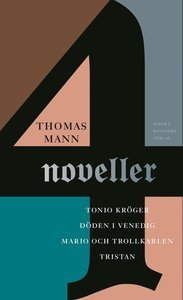
Konstnärens förhållande till det borgerliga livet är ett tema som Thomas Mann arbetade med under hela sitt långa författarskap, även i de fyra långa noveller som nu kommer i ny svensk översättning. "Tonio Kröger" om en ung författare vars far var köpman i en nordtysk stad är den tydligast självbiografiska av de fyra. Den lätt burleska "Tristan" om skönhet, kärlek och död utspelas på ett sanatorium; novellen förebådar romanen "Bergtagen". I "Döden i Venedig" attraheras en framgångsrik äldre författare av en ung pojke samtidigt som staden drabbas av kolera. Novellen "Mario och trollkarlen" från 1930 förebådar fascismen i Italien. Samtidigt är alla berättelserna psykologiskt realistiska skildringar av människorna och tiden, skrivna av en mästare. Översättning: Linda Östergaard
Author

Librarian Note: There is more than one author in the GoodReads database with this name. See this thread for more information. See also: Serbian: Tomas Man Thomas Mann was a German novelist, short story writer, social critic, philanthropist, essayist, and Nobel Prize laureate in 1929, known for his series of highly symbolic and ironic epic novels and novellas, noted for their insight into the psychology of the artist and the intellectual. His analysis and critique of the European and German soul used modernized German and Biblical stories, as well as the ideas of Goethe, Nietzsche, and Schopenhauer. His older brother was the radical writer Heinrich Mann, and three of his six children, Erika Mann, Klaus Mann and Golo Mann, also became important German writers. When Hitler came to power in 1933, Mann fled to Switzerland. When World War II broke out in 1939, he emigrated to the United States, from where he returned to Switzerland in 1952. Thomas Mann is one of the best-known exponents of the so-called Exilliteratur.